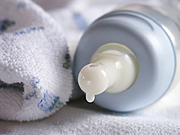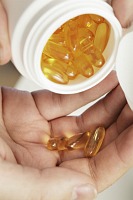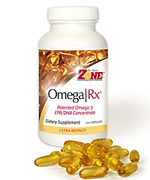Research on Fish Oils
and Pregnancy
|
|
Is it safe to mix fish oils and pregnancy?
Ensuring your unborn baby receives the nutrients it needs for healthy growth is very important. The growing popularity of omega 3 fish oil supplements has some Mothers' questioning if these products are safe to use during pregnancy.
What are the health benefits for your unborn child? Are fish oils harmful to the fetus? Am I exposing my unborn child to mercury?
It's proven that fish oils are good for your heart; and the research on taking fish oil and omega 3 supplements during pregnancy offers some encouraging evidence.
Health Benefits of Fish Oils during Pregnancy:
May lead to increased blood flow to uterus, promoting an environment more conducive to pregnancy.
May lower the risk of premature births.
Can boosts your baby's immune system and help your child fight infections.
Improves infant visual acuity and enhances body development.
May lower your baby's risk for getting allergies.
Research on Omega 3 Fatty Acids, Fish Oils and Pregnancy
The following information looks at how taking omega 3 fatty acids and fish oils during pregnancy may affect infant development and maternal health.
Please click on each category to be taken to that section for more information:
| Eye & Retinal Health | Infant Formula | Childhood Allergies | Asthma Risk | Brain Function | Problem Solving Skills | Nervous System | Post-partum Depression | Eating Fish & Mercury |
1. Fish Oils may Boost Eye Health in Babies

|
Poland - One of the risks for premature babies is they may be born with insufficient stores of the omega 3 fatty acid, docosahecaenoic acid (DHA).
This fatty acid is vital for the proper development and growth of the retina's rods and cones; important components for healthy eyesight.
A study published in Pediatrics Journal showed 44 premature infants given a fish oil-supplemented formula of DHA exhibited a lower risk for retinopathy and laser therapy to correct poor retinal development.
Studies indicate that maternal breast milk is superior to infant formula due to the natural inclusion of essental fatty acids delivered from the mother to child.
It could be hypothesized that combining fish oils and pregnancy may help increase the level of DHA and EPA delivered to the fetus thereby improving retinal growth and reducing the risk for DHA-deficient retinopathy.
2. Health Benefits of Omega 3 Milk Formulas

Omega 3 formula may |
Knoxville, Tennessee - Breastfeeding is still the best way to give your baby a good head start to a healthy life. But what if you can't breast- feed?
Are infant formulas with omega 3 supplements an effective substitute for meeting your baby's nutritional needs?
It turns out that researchers at University of Tennessee noticed babies fed formula supplemented with omega 3 fatty acids performed better on specialized eye tests and attention tests.
The babies were fed an infant formula supplemented with docosa- hexaenoic acid (DHA), a fatty acid found in fish oil supplements and fatty fish.
At 12 months of age, the babies were tested for memory and attention spans.
And the results are:
The babies fed the DHA supplement focused their attention more frequently than babies not getting the omega 3-enriched formula.
Positive effects were seen up to 10 months after DHA supplements were stopped.
This test confirmed earlier evidence that omega 3 fatty acids can increase how fast infants process information.
Researchers believe omega 3 fatty acids found in fish oils are essential for healthy brain and vision development. These healthy fats help your body produce cellular membranes in both the eye and brain. Taking fish oil or omega 3 supplements during pregnancy is one way to provide these essential nutrients to your baby.
3. Fish Oils may Reduce Risk for Newborn Alleriges
Australia - Researchers from the School of Pediatrics and Child Health at the University of Western Australia believe taking fish oils and pregnancy supplements may help prevent some inflammatory conditions from developing.
It's believed that many health conditions, such as asthma and allergies, could be triggered by an inflammatory response.
Scientists believe the dietary supplementation of omega 3 fatty acids from fish oils may reduce the risk for newborn alleriges.
4. Fatty Fish or Fish Oils may Reduce Asthma Risk

Fish oils during pregnancy |
Los Angeles, California - The Department of Preventative Medicine in University of Southern California conducted a study looking at the types and amounts of fish eaten during pregnancy and the prevalence of asthma in these mothers' children.
Would eating a diet high in fish oils decrease your child's risk for asthma?
The researchers compared diets providing high and low amounts of omega 3 fatty acids and the prevalence of asthma.
Researchers discovered pregnant women who ate fatty fish at least once per month, and whose diets included high amounts of omega 3 fatty acids, reduced their child's risk for asthma.
The child of women whose diets were deficient in omega 3 fatty acids appeared to have an increased risk for developing asthma.
Researchers concluded that eating oily fish during pregnancy may offer some level of protection to babies from developing asthma and other inflammatory health conditions.
While the argument may be strong for the use of fish oils and pregnancy health, there are many other factors to consider for optimal maternal health, including getting sufficient pre-natal care.
5.Omega 3 Fatty Acids Improve Infant Brain Function and Growth
Beijing, China - Researchers at the Institute of Nutrition and Food Safety in Beijing believe there's a distinct relationship between a pregnant and lactating mother's intake of omega 3 fatty acids, particularly docosahexaenoic acid (DHA), and the effect DHA has on the development of the fetus and newborn infants.
Scientists found the following benefits in infants whose mothers had increased omega 3 fatty acids during pregnancy:
Having higher overall levels of DHA.
Possessing better development in visual acuity (vision sharpness).
Exhibiting higher developed brain function.
Better body development.
Lipids make up over 50% of the human brain; with DHA comprising of about 30% of the brain and 50% of the retina.
It's believed that since the infant relies on the mother for its supply of DHA and omega 3 fatty acids, it's important to know that any deficiencies in maternal DHA may affect neurological and retinal development in the baby.
6. Effects of Omega 3 Fatty acids on Problem Solving in Infants

|
United Kingdom - While human breast milk contains a natural source of omega 3 fatty acids, many infant formulas may provide these healthy fats to infants.
Scientists performed a randomized trial to determine if there is any relationship between omega 3 enriched formula and cognitive funtion.
Forty-four (44) infants were randomly selected to receive either an infant formula supplement with or without omega 3 fatty acids from birth to 4 months of age.
Researchers measured cognitive function on the infants at 10 months of age and found a higher ability for intentional problem solving in infants fed the omega 3 supplemented formula.
It's believed that omega 3 fatty acids play an important role in cognitive development in newborns and may relate to higher IQ scores later in life.
7. Omega 3 Fatty Acids Help Nervous System Development
Egypt - Researchers realize that breast milk provides the full complement of fatty acids required for healthy neurological and nervous sytem development in newborns.
A comparison was made between the difference in nervous system development of infants fed regular formula and breast milk.
Researchers looked at specialized tests that measured neurological and nervous system function including visual evoked potientials and auditory brain stem stimulation.
Scientists found infants feed omega 3 breast milk exhibited more mature nervous system development and the omega 3 fatty acids are important for earlier development and growth of the nervous system.
8. Can you use Fish Oils for Post-Partum Depression?

Can fish oils prevent post- |
Wellington, New Zealand - A Psychology department at Victoria University, New Zealand, did a study to see if eating fish will reduce the risk for post-partum depression.
Eighty-eight (88) first-time mothers participated in this study. Half this group scored positive on a Depression Screening Test and the other half was the Control group (they scored below the threshold for depression).
Fish consumption was measured during pregnancy and omega 3 levels and depression scores were measured post-pregnancy.
Researchers looked at the following parameters to determine any relationship between fish oils and pregnancy-induced depression:
- The amount of fish eaten
- Omega 3 levels
- Test scores for post-partum depression
Researchers found no relationship between post-partum depression and fish consumption in early pregnancy.
Editorial Comments on Fish Oils and Pregnancy Research:

Fish oils have |
There are many published research articles on the health benefits of fish oils and omega 3 fatty acids.
The possible health benefits between fish oils and pregnancy include infant development and enhancing a women's fertility.
Researchers at the Department of Obstetrics and Gynecology, University Medical Centre in Rotterdam reported that a high intake of omega 3 fatty acids, particularly EPA and DHA, improve embryonic growth.
Another study published in the 2009 February Issue of British Journal of Nutrition found a diet high in omega 3 fatty acids resulted in improved fetal growth.
The above research on omega 3s', fish oils and pregnancy appears to present the following benefits:
May lower the risk of premature births.
Reduced risk for infant omega 3 deficient eye and retina disorders.
Improved immune response in newborn infants and may lower the risk for asthma and allergies.
Appear to improve infant performance on visual sharpness tests, attention tests and processing of information.
May foster earlier development and growth of an infant's nervous system.
Enhances fetal growth and may benefit infant body development.
Increasing your intake of omega 3s or fish oils may lessen the severity of painful menstrual cramps.
Combining the use of omega 3 supplements, fish oils and pregnancy appear to have many benefits for women.
Eating Fish and Mercury Exposure
Eating fatty fish does supply important omega 3 fatty acids, however, the possible exposure to mercury may cause concern for pregnant or lactating mothers.
The Environmental Protection Agency (EPA) and Food and Drug Administration (FDA) recommends:
" The risks from mercury in fish and shellfish depend on the amount of fish and shellfish eaten and the levels of mercury in the fish and shellfish. Therefore, the Food and Drug Administration (FDA) and the Environmental Protection Agency (EPA) are advising women who may become pregnant, pregnant women, nursing mothers, and young children to avoid some types of fish and eat fish and shellfish that are lower in mercury."
For more detailed information regarding mercury exposure from eating fish, read the EPA's What you Need to Know about Mercury and Shellfish. This is important information for pregnant women, nursing mothers, children and if you're a woman who might become pregnant.
How to Take Fish Oils and Pregnancy Concerns
Omega 3 fatty acids are important healthy fats needed for proper development and health. Your body can't manufacture omega 3 fatty acids very efficiently, so you need to get them from your diet.
While fatty fish, such as salmon and mackerel, are excellent sources of these fats, there is a risk of exposure to mercury.

OmegaRX- |
An excellent way to get omega 3 fatty acids is by taking a highly-purified, omega 3 concentrated fish oil supplement.
You should look for an omega 3 supplement that's been analyzed to ensure it provides you the highest concentration of omega 3 fatty acids and the lowest possible levels of mercury, PCB's, dioxins and other contaminants.
The omega 3 fatty acids, eicosapentaenoic acid (EPA) and docosahexaenoic acid (EPA) have been shown to have positive effects on many different areas of the body, including embryonic development, neurological and nervous system health.
Ensuring you're getting these essential fatty acids in your diet may play an important role to maintaining appropriate fetal and infant health.
Important Note:
| Give Feedback! NEW! Have you used Fish Oils? Click Here and Share Your Experience With Us Read Other Visitors' Feedback Here |
Fish Oils and Pregnancy Research References:
Increased preconception omega-3 polyunsaturated fatty acid intake improves embryo morphology. Fertil Steril. 2011 Apr;95(5):1820-3. Epub 2010 Dec 3.
Fish-Oil Fat Emulsion Supplementation May Reduce the Risk of Severe Retinopathy in VLBW Infants. Pediatrics Vol. 127 No. 2 February 1, 2011
Visual-acuity development in healthy preterm infants: effect of marine-oil supplementation. American Journal of Clinical Nutrition, Vol 58, 35-42
Maternal fatty acid intake and fetal growth: evidence for an association in overweight women. The 'EDEN mother-child' cohort (study of pre- and early postnatal determinants of the child's development and health). British Journal of Nutrition 2009 Feb;101(4):583-91
Cognitive assessment at 21/2 years following fish oil supplementation in pregnancy: a randomized controlled trial. Archives of Disease Childhood, Fetal & Neonatal Edition. 2006 Dec 21
A Randomized Trial of Visual Attention of Pre-term Infants Fed Docosahexaenoic Acid Until Two Months Lipids. 1996 Jan;31(1):85-90.
Does Fish Oil Supplementation in Pregnancy Reduce the Risk of Allergic Disease in Infants? Fish oils and Pregnancy Study - Current Opinion in Allergy & Clinical Immunology. 2005 Jun;5(3):215-21.
Maternal Fish Consumption During Pregnancy and Risk of Early Childhood Asthma. The Journal of Asthma. 2005 Jul-Aug;42.(6):513-8.
Relationship Between Maternal DHA Intake and DHA Status and Development of Fetus and Infant, Journal of Hygiene Research (Wei Sheng Yan Jiu) 2005 Mar;34(2):231-3.
Fish Consumption in Pregnancy and Omega-3 Status After Birth are not Associated With Postnatal Depression. Fish oils and Pregnancy Study - Journal of Affective Disorders. 2006 Feb;90(2-3):131-9.Fish oils and post partum depression
Neural maturation of breastfed and formula-fed infants. Acta Paediatr. 2004 Jun;93(6):734-8.
Effect of long-chain polyunsaturated fatty acids in infant formula on problem solving at 10 months of age. Lancet. 1998 Aug 29;352(9129):688-91
back to Benefits of Fish Oil
Site Map | Site Policies | About Me | Contact Me
Do not attempt self-diagnosis or self-medication based on our information.
Please consult your health-care provider if you wish to follow up on the information presented.






